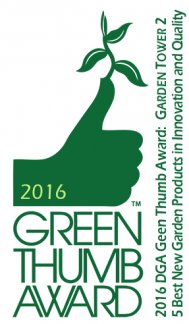Growing Indoors: Garden Towers are currently being used in greenhouses, hoop-houses, sun-rooms, and even indoors in front of a south facing window through the winter months.
For an ideal indoor experience, we highly recommend the following:
1) Choose the lightest, fluffiest potting mix you can get! A tower can be planted with as little as 45lbs of dry potting soil provided the mineral content is low and organic content is very high.
2) Plan ahead to move a tower. Let it dry out as much as can be tolerated (not to the point of dessicating the soil and damaging plants). This can take 1-3 weeks depending on conditions. Garden Towers can hold up to 16 gallons of absorbed water, which increases their weight by 130lbs!
3) Cover the ventilating holes on the compost tube cap with a fine mesh or screen that will allow air movement but not allow the entry of flying insects. This can be accomplished with a piece of plastic window screen and zip ties or tape.
4) Supplement the sunlight. The cheapest and easiest method of grow-lighting is to use standard reflective bulb fixtures and install full-spectrum (daylight) florescent tubes or CFL bulbs. These are low cost, reliable, and very efficient. Winter crops can be successfully grown with as little as 120 watts of daylight CFL bulbs (equivalent to 500 incandescent watts).
5) Plant crops appropriate to your daytime and nighttime temperatures in your indoor environment. Tropical plants like tomatoes need highs in the 70's+, and lows above 50 degrees (f). Broccoli and lettuce will do great with daytime temperatures of 55 degrees or more and cool nights above freezing.
6) Compost performance will vary by temperature. Worms will love your indoor Garden Tower habitat; however, their activity is directly related to temperature. Only add kitchen scraps as more space is generated within the composting column.
7) Do not water excessively. Without wind and in the higher humidity of an indoor setting, plants do not use nearly as much water as they do outside under the sun. If you saturate the soil in your Garden Tower under these conditions, it could take weeks to return to a normal state of moisture which could have negative consequences for the soil and the vermicomposting worms. For this reason, we don't recommend watering for compost tea indoors. Higher than necessary soil moisture reduced aeration in the soil and compost, and can lead to a number of bacterial and fungal diseases in plants.
(Photo ideas coming soon)
More dedicated and $$ lighting solutions can be found below:
Vertical organic gardening & composting anywhere!
Garden Tower: The ultimate patio farm by Garden Tower Project.






















